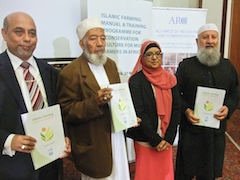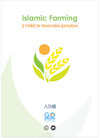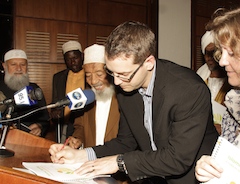|
|
|
|
 |
|
Islamic Farming
 |
 |
 |
Dr Husna Ahmad, chief executive of Global One 2015, with (from left to right) Saif Ahmad (Islamic Help), Professor Abdul-Ghafur El-Busaidy (SUPKEM, Pir Sultan Naizul Hassan, founder of Islamic Help. |
Exciting news! The first manual in conservation agriculture specifically designed for Muslim farmers in Africa was launched in Nairobi, Kenya, in March 2014 to great anticipation and excitement among the Muslim community.
Islamic Farming: A Manual for Conservation Agriculture is a brand new curriculum that integrates Qur’anic scriptures and teachings about caring for the Earth as a religious responsibility with practical training in conservation agriculture.
Conservation agriculture is a proven form of sustainable agriculture that has been shown to double crop yields in less than five years while also protecting the environment for future generations. For this reason, it is also considered a form of climate-smart agriculture.
 |
 |
 |
The Islamic Farming toolkit |
Download a copy of the Islamic Farming Toolkit
You can download a PDF version of the Islamic Farming manual here.
Speaking in the language of the Qur'an and Sunnah
This is the first manual that speaks to Muslim farmers in the language of the Qur’an and the Sunnah and as such offers significant potential to bring sustainable farming principles and practices to millions of Muslim farmers in Africa for the first time.
ARC developed the manual after requests from our Muslim faith partners for help in developing a faith-based approach to agriculture. We commissioned Global One 2015, a UK-based, Muslim-led international development organisation, to work with Islamic scholars and clerics to provide the faith teachings and principles underpinning the manual. ARC's Sam Adams wrote the practical section on conservation agriculture. For more about the the development of Islamic Farming, see below.
 |
| "It is He who created for you all that is in the Earth" - Al Baquarah 29 |
|
 |
 |
Around 130 people attended the launch, including two senior representatives of Kenya's Ministry of Agriculture who both welcomed the launch of the manual as a ground-breaking initiative. It was co-hosted by the Supreme Council of Kenya Muslims (SUPKEM), our partner in Kenya who are leading the development of Islamic Farming.
Some of the biggest smiles were seen on the faces of the 22 farmers who had attended the workshop we held in January to field-test the manual before publication. (Read about the workshop in this blog by ARC's Sam Adams.)
They've been putting what they learned into practice and spoke excitedly about how well their crops, grown according to this new conservation agriculture approach, were doing. SUPKEM is setting up 11 Islamic Farming demonstration farms and training sites in Kenya - and has already trained a further 200 people since the first workshop in January.
How Islamic Farming came about
 |
 |
 |
ARC's Sam Adams signs the official copy of Islamic Farming at the launch in Nairobi |
In September 2012, Muslim participants listened with great interest to the presentations on a Christian approach to agriculture during ARC's Nairobi celebration and launch of Long-Term Faith plans. They were particularly struck by the way it linked a farmer’s faith beliefs to the way he or she cared for the land. In the process, it also improved crop yields and protected the environment.
At the end they had a question: “What about Muslim farmers? Why isn’t there a faith-based approach to farming for our farmers?” It was a valid question; out of one billion people in sub-Saharan Africa, 234 million are Muslim, and many are small scale farmers.
As a result of this call, ARC commissioned Global One 2015, a UK-based international Muslim NGO, to work with faith partners in Africa to develop an Islamic approach to sustainable agriculture. The idea was that it would take a faith-based approach to farming, and would be based upon conservation agriculture in terms of practical application.
|
 |
|
|
|
|
|

